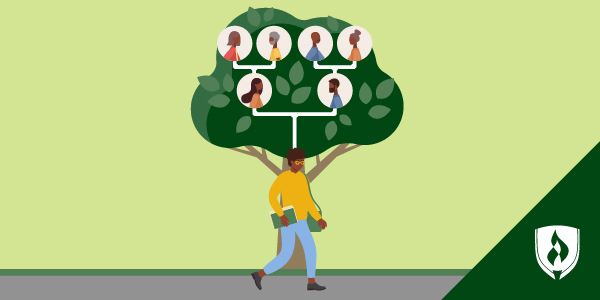
Would you consider yourself a lone wolf when it comes to projects and planning? Does the thought of collaborating with others leave you with a sense of dread? If it does, then you might have a tough road ahead of you.
“Few jobs today don’t involve working with others in teams,” says Andrew Selepak, professor at the University of Florida. While the collaboration may look very different from industry to industry, it’s likely to form part of your job. This is precisely why teamwork skills are a vital element in today’s workforce. Whether you’ve had a bad experience working in groups in the past or you believe operating on your own is more efficient, there will come a time when working in a group will not only be helpful—but also vital.
Teamwork skills will serve you well in your future career, but it is also extremely beneficial during your time in school. Regardless of what program you’re enrolled in, teamwork skills will likely be incorporated in your coursework and could go a long way in helping you excel academically. It’s time to stop dreading group work and leverage these opportunities to hone a valuable skill set.
Teamwork skills in school
“I often hear the collective groan of my students whenever I announce a group project,” says VP of Magas Media Consultants and Pace University associate professor Jennifer Lee Magas. “Group projects seem to instill a horror in students like nothing else—and it’s understandable.”
Much of the dislike of group projects comes from students not trusting their peers to pull their weight and place an equal amount of time and effort into the work.
Magas says the best strategy to avoid negative group outcomes is to communicate. “It’s a simple fact, and it may not be all that comforting on the surface, but the secret to accomplishing work with others is to talk about it. Plan who is doing what, know what your role is, and if you’re shouldering too much work, then let that be known.”
“The benefit [of group work] is learning an openness to critique, which is essential for healthy working relationships,” says Heather Walker Peterson, English department chair at the University of Northwestern, St. Paul. Peterson advises students to practice having a voice in project management by discussing the process and initiating a plan for group meetings.
“In school and in work, everybody just wants to come out on the other side with a good product to show for their effort,” Magas says. “It’s best for everyone to know truthfully what your schedule is like, how you function, what your best assets are and what you think someone else could do better.”
This kind of communication is much easier to learn in a school environment then on your first project in a new job. And it can save you lots of frustration, or even costly mistakes, later on. Teamwork can also improve the outcome of a school project because you’re able to draw upon each other’s unique strengths. This ability, of seeking the expertise and ability of other people will serve you well in your academic pursuits—and throughout your career.
“Students need to realize that in the real world, they will have to work with and for others no matter what,” Selepak says. “Learning this while in school and dealing with different personalities and people with different abilities will only help them do it after school when their job is on the line.”
Teamwork skills in a career
While it’s true some jobs depend less on teamwork than others, the uses for collaborative skills in a career are still applicable and nearly endless. “Outside of school, the working world is all about communicating with other people,” Magas says. “But working with others can be hard. Managing time, planning meet-ups and functioning as one entity takes practice and loads of patience.” In this sense, the more practice you get in a group setting, the better.
“In software development and technology fields, the ability to collaborate and work as a team is critical a project’s success,” says Alan Zucker, founding principal of Project Management Essentials LLC. Zucker points out that two of the bigger trends in technology today—Agile and DevOps—both depend on teamwork in their core philosophy.
In this environment, team members interact constantly. “Research has shown that these small, collaborative teams are highly effective,” Zucker says. “Agile projects are, on average, three times more likely to be successful than traditional projects.”
The success of these models is likely to lead to a wider implementation of teamwork-dependent projects across many industries. Zucker says applicants who can demonstrate teamwork skills are more likely to land their jobs. “The ability to work with customers or other team members is a critical soft skill.”
“Teamwork is always an incredible lesson, and an excellent way to gather basic life skills that make you a better candidate for any position in the business world,” Magas says. “Beyond all traits, having good people skills puts you at the top of the ‘desirable’ list.”
Leveraging teamwork skills in the job hunt
The tricky thing about a job application and interview process is knowing how to represent your strengths and experiences. Our sources agree that an individual with excellent teamwork skills is an attractive candidate for most positions. But how do you showcase those soft skills to your potential employers?
“A common interview question is ‘Tell me about a time when you worked on a team,’” Zucker says. “Many students will talk about a group or team project.” If the project involved challenges, such as coordination difficulties or frustrating team members, your response to the problem is a good focal point to talk about. Zucker emphasizes that these challenges are also common in the workplace.
“The ability to work with others, which demonstrates high emotional intelligence, is a skill that transcends specific environments. So if you were the leader of a club or team and brought people together for the common good, then you have the experience,” Zucker says.
How can I improve my teamwork skills?
The answer is pretty simple—join a team! Whether it’s forming a study group for one of your classes or joining club or organization in your field of study, putting yourself in situations that force you to work with others will help you become more comfortable. If you’re not in school, that’s okay too. Start volunteering or begin planning a book club with your friends. Interacting with others in any setting will help you build your teamwork skills.
Having some experience under your belt can help you boost your hiring potential. Those real-life scenarios can help you highlight your competency in this area.
There’s no better time than now…
Teamwork is important, and the more experience you have, the better. Get started today by joining forces with others to accomplish a task or project. Whether or not you’ve worked with groups before, there’s always room to improve.
But teamwork skills aren’t the only ways to increase your value as a hire. Managers in all industries prioritize different soft skills when looking through job candidates. Get the details and check out our article, “What Are Soft Skills? Hiring Managers Reveal Their True Thoughts.”
EDITOR'S NOTE: This article was originally published in March 2015. It has since been updated to include information relevant to 2018.




